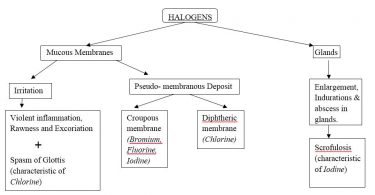
Mind symptoms of psora and pseudo-psora according to J H Allen
Abstract:
This article deals with the understanding of the mind symptoms of psora and pseudo-psora miasms according to J H Allen.
Key words– mind, miasm, psora, pseudo-psora, J H Allen
Introduction–
The word miasm has originated from the Greek word “Miasma” which means a stain, pollution, defilement of an obnoxious atmosphere or infective material. Hahnemann found that when there was present a marked miasmatic state , which was due to some specific cause rather than venereal disease lay at bottom of chronic or acute expression he named this unknown devitalizing principle as Psora. Dr. J. H. Allen introduced the tubercular miasm in his book “The Chronic Miasms”. He stated that the miasms psora and syphilis gave rise to tubercular miasm and called it pseudopsora.
Mind
- Psora quick, active
- syphilis-dull; sycosis- cross, irritable
- prostrated easily from mental exertion or impression
- heat of the whole body after mental impressions or exertions
- mental depression
- despondency
- timidity, with sense of fatigue
Thoughts
- vanishing of thoughts while reading or writing
- cannot control thoughts
- at times seems to be deprived of thought
Anxiety
- sadness, anxiety and dread of labor-
- great inward uneasiness and anxiousness
- anxious, filled with forebodings-fear of death, or of illness or that their case is hopeless and incurable
- repeated attacks of fearfulness during the day (with pain or without)
- In psora, when these restless mental spells come on, they are compelled to move about.
- > perspiration,
- mental anxiety- new moon, or at the approach of the menses in women.
- >Weeping
- oppression and anxiety on awakening up in the morning
- oppression and anxiety on awakening up in the at night, syphilis
- it drives them out of bed, inducing symptoms of suicide.
- when the weather changes (sycosis).
- sudden transition from cheerfulness, to sadness, or to peevishness without any apparent cause.
- in severe forms of hysteria, the attacks would grow more frequent and more severe
- When they come frequently and severe, especially in young girls or young women under 25 years of age-pseudopsoric disturbance
- The least mental disturbance unbalances them, the nervous system becomes exhausted from their repeated attacks, when it is followed by tubercular manifestations, due to the lowering of the nervous forces in the organism.
- Melancholy, violent beating of the heart, anxiety and extreme nervousness often follow the awakening of psoric patients from sleep.
- Pulsations in different parts of the body
- feeling of construction about different parts (certain nerve centers, or points of reflex, arterial excitation, flashes of heat)
Fear
- Dread of labor, of being alone, dark
- dread of night, syphilis
- easily frightened- most trifling causes
- their fear often begins with trembling and shaking of the body, followed by great weakness and muscular prostration and often with copious perspiration.
- chills or chilly sensations, fainting spells, headaches, nausea, vomiting and a host of symptoms follow attacks of fear, even to convulsions, epilepsy and spasms.
- become dizzy or faint in a crowd, or when they meet strangers, or when any unusual ordeal is about to take place, they have headaches, faint spells, nausea, vomiting, or they are suddenly taken with diarrhea.
- They are easily bewildered, inclined to be irritable, cross (sullen, morose, syphilis or sensitive to many impressions, such as odor of flowers, smell of cooking foods, to atmospheric changes, bad news, joy, or they are very easily disturbed mentally.
- How easily they fly into a passion, and yet in a moment again they weep and are penitent.
- In their fits of anger, you will usually notice that they tremble in their rage, and when it is over they are greatly prostrated and often sick for a time.
- The true psoric patient is bright, active and quick in his movements.
- The latent syphilitic is dull, stupid, heavy and obstinate.
- The psoric patient is usually exalted, the syphilitic depressed, although when the psoric patient has the dumps, everybody knows it and can see it, while the syphilitic patient keeps it to himself, and the first thing you know he has committed suicide by jumping in the lake or river.
- The syphilitic patient does not worry his friends with his troubles much; he is a close-mouthed fellow,
- psoric patient is a constant annoyance to his or her friends;
- chronic complainer, a chronic grumbler, fault finder, never satisfied with his conditions in life;
- they are the abused ones, the neglected ones, and yet at the same time every one is doing all they can for them.
Mood and memory
- changeable in their moods (syphilis, fixed in their moods).
- Time goes too fast or too slow.
- The psoric patient is absent minded in a general way, but the sycotic patient is absent minded only in certain things;
- he forgets words, sentences and previous lines that he has just read
- he wonders how the simplest word is spelt
- he has momentary loss of thought, or he loses the thread of his discourse frequently
- he is constantly stopping to find it, which cause him to repeat.
- Often this is due to his inability to find the right word.
- In the delirium or mania of psora, there is no end to his words; words are multiplied and he has no trouble in finding them; his thoughts run so fast and words are so multiplied that he does not know what to do with them.
- sycotic patient-who cannot find words and if he does, he is not certain if they are right.
- If he is writing he is not certain whether he is using the right words or he is in doubt about his spelling; he drops words or letters or uses the wrong ones.
- When he is giving his case to the physician, he has difficulty in giving his symptoms, or he is afraid that he will not give them right, or that he will forget something. In speaking he is always afraid that he will forget something, or that he will use the wrong words.
- This is painful to him and causes him much annoyance and suffering.
- This is not so of psora; he may be so depressed that he cannot speak, but when he is able to speak, he is at no loss for words; in fact, they come to him in mental troubles faster than he can speak them.
- A recovery of their health seems an impossible thing; they do not look for it, or have any hopes of it.
- This is especially true in patients suffering from suppression of any kind and if often does not disappear until the suppressed condition is re-established, when all will suddenly clear up.
- In the psoric diseases, the delirium and the action of these patients is often disgusting and they have more foolish fancies than they would have in true delirium.
- In syphilis and sycosis, the reasoning powers are slow and they are constantly condemning self; while these symptoms may be present in psora, they are constant in a mixed miasm. The desire to kill or to destroy life is seldom a purely psoric mental symptom.
- The suicidal patients are, as rule, patients whose organisms are tainted more or less with syphilis or sycosis.
- Often, we find the syphilitic patient morose and mistrustful
- there is also a desire to escape or to get away from self.
- This often drives them to suicide.
- In sycosis they are as a rule always cross and irritable and disposed to fits of anger, recollection of recent events is difficult, while things long past is well remembered; this is quite a constant mental symptom of sycosis.
- In the syphilitic patient, his thoughts and ideas vanish away from him and he has not the mental ability to bring them back; he reads over and over again a verse or a few lines, but he can’t retain it; in a moment it is gone from him; there seems to be a sort of mental paralysis; he even forgets what he was about to utter.
- Sometimes we see this so marked in tubercular children all through their school days, and often we attempt to whip them into line with other children whose minds are clear and strong and who have no such mental depression or devitalizing element in their organism
- The syphilitic and sycotic patients are relieved of their mental stress and their mental disturbance, like psora, by some external expression of the disease, for instance a leucorrhea or a gonorrheal or catarrhal discharge of any form returned, relieves a sycotic patient at once.
- Of course this is in the secondary stage, for in the tertiary stage he may be relieved by an eruption of warts, or by fibrous formations or growths of any kind.
- The miasms are the maggots that are born within the brain,” as Shakespeare says, and those maggots never die until overthrown by similia.
- Psoric attacks of all kinds are relieved by some physiological eliminative process, such as diarrhea, copious urination, or perspiration.
Reference
J Henry Allen. The chronic miasms psora and pseudo-psora. New Delhi: B Jain Publishers Pvt Ltd; 1998.





